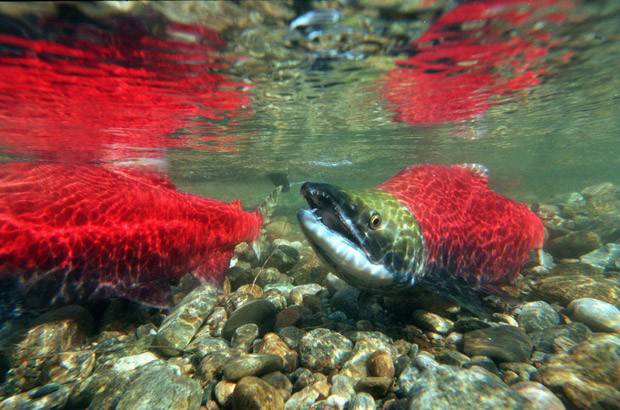With the deadline approaching for the B.C. government to renew 20 fish farm licences, a group of marine tourism operators are imploring the government to let the licences go.

Four marine tourism industry operators, speaking on behalf of 75 other companies, came to the B.C. Legislature on Monday to speak out against the fish farms along the coast.
“Our wilderness tourism industry is worth billions to the B.C. economy and we employ tens of thousands of British Columbians in skilled jobs,” said Wilderness Tourism Association of British Columbia president Kevin Smith.
“With the closed containment land-based alternatives now available and the risks to to B.C.’s flagship wilderness tourism from open-net pen salmon farms being so great I support the premier not renewing these farm licences.”
The 20 licences up for review expire on June 20. There are currently about 50 fish farms operating in B.C. waters. The B.C. Salmon Farmers Association says the industry is critical to ensuring that wild salmon populations are not overfished.
“Salmon farming plays a critical role in saving our wild salmon stocks by providing an alternate food source,” said BC Salmon Farmers Association spokesperson Shawn Hall. “There aren’t enough wild fish out there to meet human demand. If we want to eat fish, we have to eat it. Farming it responsibly is our passion.
“If farms were suddenly to disappear there would be increased pressure on overfishing.”
- Joffre Lakes to close for 3 periods this year under agreement with First Nations
- ‘Why aren’t we doing more?’ White Rock on edge with killer on the loose
- B.C. carjacking victim says she doesn’t trust the ‘catch-and-release’ system
- Inquest into fatal Surrey hostage-taking recommends cameras for ERT teams
Hall said B.C. is the world’s fourth largest producer of farmed salmon and the industry generates $1.5 billion in economic benefits for the province every year.
But the tourism industry is concerned that fish farms have reduced wild salmon stocks and have introduced sea lice into the water.
Georgia Murray, whose family owns and operates Nimmo Bay Resort, says that Norway has seen their wild salmon stock diminished because of fish farms.
European companies now own some of B.C.’s fish farms.
“We are now letting these foreign owner corporations come into our waters and bring the same disease and destruction that killed off their own wild stocks,” Murray said. “We have a deadly situation.”
WATCH HERE: DFO launches pilot project amid wild salmon population concerns

The B.C. Wilderness Tourism Association says their industry, which includes fishing, whale watching and other wildlife adventuring, generates $1.5 billion in annual expenditures and supports 26,000 full-time jobs.
“Without the wild salmon we won’t have any more grizzly bears for our customers to view, we won’t have any more orcas for our customers to view,” said Sea Wolf Adventures guide operator K’odi Nelson. “We have seen over the past number of years the steady decline of the salmon that once use to be so abundant in our rivers.”
The provincial government has control over the licences, but the federal Department of Fisheries and Oceans regulates the water. One suggestion is that the provincial government require companies to move their operations onto land, technology that has been tried out in other countries.
“Wild salmon policy is really important to the health of the species,” said Eagle Wing Tours co-owner Brett Soberg. “In 45 years of researching southern resident whales and viewing them, this last May was the first time we did not see them in these waters and that is a very loud message. The NDP government and the DFO need to hear that.”
Last week, Premier John Horgan appointed a 14-person council to create a plan to protect the province’s wild salmon population. Following the announcement Horgan was asked about whether fish farmers should be worried about losing licences.
“I think their concern should be that there is a divide in British Columbia about the continued existence of the industry,” Horgan said on Friday. “We need to make sure that we’re working as a government with the primary area of responsibility, which is the federal government.”




Comments